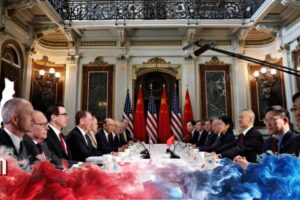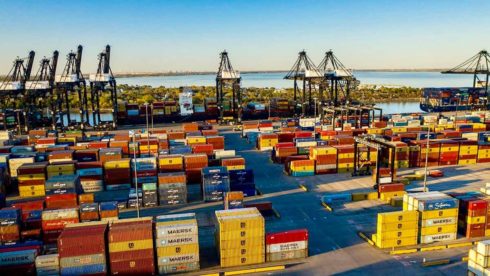Tens of thousands of dockworkers across the U.S. have gone on strike indefinitely, halting operations at major ports and sparking concerns about significant trade disruptions just weeks before the presidential election and the holiday shopping season. The walkout, organized by the International Longshoremen’s Association (ILA), affects 14 major ports along the East and Gulf Coasts, from Maine to Texas.
This marks the first significant port shutdown in nearly 50 years. While President Joe Biden has the authority to suspend the strike for 80 days to allow further negotiations, the White House has announced that no such intervention is planned at this time.
What is the Strike About?
The strike stems from stalled contract negotiations that have dragged on for months. The current contract between the union and port operators expired on Monday, triggering the strike. At the heart of the dispute is a six-year master contract that impacts approximately 25,000 port workers involved in container and roll-on/roll-off operations, according to the U.S. Maritime Alliance (USMX), which represents shipping firms and marine terminal operators.
USMX has proposed a contract offering nearly a 50% wage increase, tripling pension contributions, and enhancing healthcare benefits. However, union president Harold Daggett is pushing for more substantial wage hikes and raising concerns over automation threats. Daggett has called for a $5 per hour annual wage increase over the six-year deal, which would translate to approximately a 10% rise per year. Despite the offer, the union claims that its members, who have been affected by rising inflation, are owed more due to record profits made by shipping firms during the pandemic.
What Items Will Be Affected by the Strike?
The dockworkers’ strike is expected to have widespread impacts on several critical sectors of the U.S. economy. Time-sensitive imports like food are among the goods that will be immediately affected, with perishable items such as bananas and chocolate at risk. The ports involved in the strike handle a significant portion of agricultural exports and more than half of imports, according to the Farm Bureau.
Other industries facing disruption include tin, tobacco, clothing, footwear, and automotive sectors. European car manufacturers, who route many of their shipments through the Port of Baltimore, are particularly vulnerable. While some businesses have stockpiled goods in anticipation of the strike, a prolonged shutdown could lead to shortages and price increases. Experts warn that the longer the strike continues, the more pronounced its effects will be on various supply chains.
What Will the Economic Impact Be?
The economic implications of the strike could be severe, with estimates suggesting it could cost the U.S. economy $4.5 billion per week. Grace Zemmer, an economist at Oxford Economics, warns that over 100,000 people could temporarily lose their jobs as the strike drags on and disrupts supply chains. This ripple effect could hit other industries, especially those relying on just-in-time delivery systems, driving up shipping costs and prices for consumers.
Peter Sand, chief analyst at Xeneta, a freight analytics firm, cautions that the strike is a “trigger event” that could cause further instability in shipping logistics in the coming months. As businesses struggle with higher shipping costs, consumers will likely face shortages of goods and price hikes, compounding the economic stress many are already feeling.
How Could This Affect the US Election?
With the presidential election just six weeks away, the strike introduces an added layer of uncertainty to an already fragile U.S. economy. Unemployment rates have been rising, and economic growth has slowed, making the strike a potential tipping point. President Biden finds himself in a difficult position. While U.S. law allows him to intervene by imposing an 80-day cooling-off period, forcing workers back on the job while negotiations continue, the administration is currently opting for a hands-off approach.
Historically, Republican President George W. Bush intervened in a similar situation in 2002, reopening West Coast ports after an 11-day strike. Now, business groups like the U.S. Chamber of Commerce are urging Biden to follow suit, warning that the strike could lead to a supply chain crisis similar to the pandemic-era backlogs of 2021. However, with Biden facing a re-election campaign and a need to maintain support from labor unions, the president’s decision could carry significant political consequences.
Labor Tensions and Political Risks
Harold Daggett, president of the ILA, endorsed Biden in the 2020 election but has since expressed criticism of the administration, particularly concerning pressure on West Coast dockworkers during previous labor disputes. Daggett’s growing ties to former President Donald Trump, whom he met in July, raise further political stakes, as Trump seeks to woo working-class voters in his bid to return to the White House.
While some believe the strike could harm Democrats in the upcoming election, Rutgers University labor expert William Brucher suggests that alienating organized labor this close to the election could be an even bigger risk for Biden. Despite potential public backlash, Brucher believes the union is unlikely to back down, viewing the strike as an essential tool to pressure employers back to the negotiating table with a more favorable offer.
Long-Term Implications of the Strike
The dockworkers’ strike has broader implications that extend beyond immediate economic disruption. Labor movements in the U.S. have gained traction in recent years as workers demand better pay and protections in an era of rising inflation and technological change. The ILA’s strike may set a precedent for other industries, especially those threatened by automation.
The dispute also highlights the tensions between labor and management that have simmered since the pandemic, as workers push for a greater share of the profits reaped by corporations during unprecedented economic conditions. As the strike continues, it remains to be seen whether employers and labor groups can find common ground. However, what is clear is that the effects of this strike will be felt for months to come, both economically and politically.














